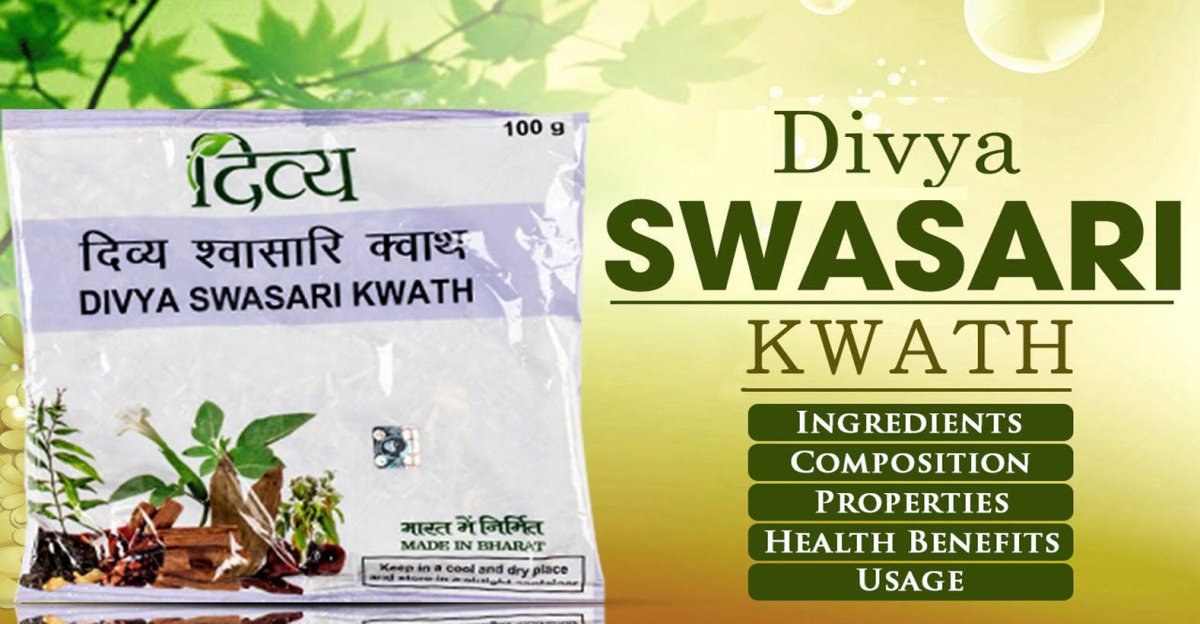Buy Patanjali Swasari Kwath Online at Distacart.com: Natural Respiratory Care Made Simple!
The respiratory problems of cough, cold, and sinusitis are seen more these days, which might be because of increased pollution, seasonal changes, and dust. If you are searching to improve your respiratory health naturally with an Ayurveda product, then Patanjali Swasari Kwath can be your ultimate solution.
This herbal decoction is prepared with the help of potent Ayurvedic herbs, which not only comfort your respiratory uneasiness but also strengthen your lungs. Now, you can buy Patanjali Swasari Kwath online at Distacart.com - an e-marketplace for authentic Patanjali products.
Patanjali Swasari Kwath comes in a pack of 100gm. It is suitable for all genders and for both kids and adults.
Why Choose Patanjali Swasari Kwath?
Patanjali Swasari Kwath-Natural Solution for Respiratory Wellbeing-Pure Ayurveda with Modern Production Techniques-Patanjali Swasari Kwath is much more than a solution; instead, it is a natural return to the normal rhythm of life.
• Authentic Formulation: Prepared as per the knowledge of Ayurveda of ages to promote maximum benefits.
• Natural Ingredients: Contains ginger, tulsi, cinnamon, and licorice to assure medicine without chemicals.
• Long-Term Benefits: Acts on a root level for respiratory problems instead of relieving symptoms.
•Safe for All Ages: Suitable for both children and adults under proper guidance.
If you’re looking to address seasonal colds or strengthen your lungs, this Swasari powder is a must-have.
Ingredients of Patanjali Swasari Kwath:
The effectiveness of Patanjali Kwath lies in its unique blend of herbs, carefully chosen for their respiratory benefits:
Licorice Root (Mulethi): Soothes sore throat and reduces inflammation.
Ginger: Clears airways and relieves congestion naturally.
Holy Basil (Tulsi): Strengthens the respiratory system and fights infections.
Cinnamon (Dalchini): Removes phlegm and has antibacterial properties.
Long Pepper Root (Pippali): Improves lung function and alleviates asthma symptoms.
These ingredients work together to make Swasari Kwath a powerful herbal remedy for respiratory health.
Composition:
Each 10ml of the Patanjali Swasari Kwath contains
- Clove- 0.12gm
- Holy basil- 0.12gm
- Cinnamon- 0.12gm
- Dry ginger- 0.12gm
- Bay leaves- 0.12gm
- Malabar nut- 0.12gm
- Sweet violet- 0.24gm
- Glory bower- 0.12gm
- Licorice root- 0.12gm
- Indian cherry- 0.12gm
- Indian laburnum- 0.12gm
- Long pepper root- 0.12gm
- Willow leaved justicia- 0.24gm
- Yellow berried nightshade- 0.48gm
Properties:
Patanjali Swasari Kwath is anti-inflammatory. It may help to reduce the bronchioles swelling and also in cleaning the windpipe.
This herbal powder also acts as an antibacterial agent. It helps the body fight against infections that are caused by different microorganisms.
Due to its anti-allergic nature, Patanjali Swasari Kwath is prescribed for asthma, tuberculosis, chronic cough and sinusitis.
Patanjali Divya Swasari Kwath is also broncho- dilatory and anti- tussive in nature.
Health Benefits of Patanjali Swasari Kwath
When used regularly, Patanjali Swasari Kwath provides a range of benefits:
Healthy Functioning: Clears mucus and promotes smooth breathing.
Manages Inflammation: Reduces inflammation in the airways for easier respiration.
Reduces Seasonal problems: Relieves cough, cold, and sinus discomfort naturally.
Improves Lungs health: Strengthens the lungs, enhancing long-term respiratory health.
Combats Infections: Acts as an antibacterial and antiviral agent to combat infections.
Swasari powder is the perfect solution for everybody seeking a natural solution to help them with their lungs.
How to Use Swasari Kwath for Best Results:
Swasari kwath is so trouble-free to make and use.
- Take 5-10 grams of Swasari Kwath powder Mix it with 400ml of water
- Boil this concoction until it reduces to 100ml Strain and let it cool
- Add honey if you want (for taste)
- Twice daily- In the morning when your tummy is empty, and another one at night, an hour before dinner
- Patanjali Swasari Kwath can be used for at least 10 days for sure or as advised by the Ayurveda expert.
Buy Patanjali Swasari Kwath Online at Distacart.com
If you need to shop for Patanjali products online then, Distacart.com is the place. Distacart.com makes all sorts of Patanjali shopping hassle-free. At Distacart.com, you will get genuine products, safety on payment options, and speedier deliveries, so you receive the optimum Ayurveda at your doorstep.
Conclusion:
Patanjali Swasari Kwath is not a solution; rather, it is a step in the direction of good breathing and, hence, good health. It may be seasonal breathing problems or maybe an attempt to prevent one; Patanjali Swasari Kwath is that additional one needed for their daily diet. Buy Patanjali Swasari Kwath online at Distacart.com today and say hello to the breathing-free, herbal and Ayurvedic way.














